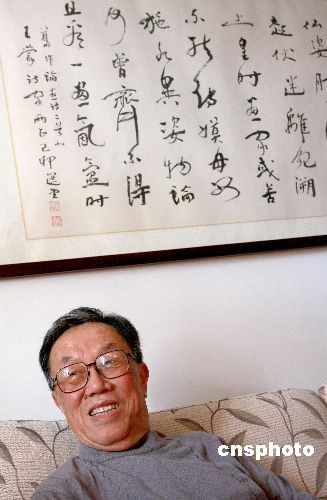"An aging man in his seventies, who writes and has some experience", that's how Wang Meng describes himself. The renowned writer who won fame when he was 19 years old has had a colorful life over the past half a century. He was labeled a "rightist" in 1958 but was appointed Culture Minister after China's reform and opening-up. He has published more than 15 million words and even in his seventies still writes for four to five hours a day.
 |
|
Wang Meng still writes for four to five hours a day.
|
Wang is a man of uncommon experience, outstanding talents and insight. He clearly and cleverly paints a picture of the social and moral changes of the last 30 years, changes that he regards with a tolerant and humanistic attitude.
"The biggest event of my life, indeed of the twentieth century, was the revolution that woke up the Chinese people. It changed history but also daily life," said Wang when he talked to China News Service recently. "After the revolution, we were faced with a transition from high tide to low tide; more precisely, we went back to normal."
"Normal means there are ups and downs. But most of the time, life is lived in tranquility," added Wang. "But we have had many extraordinary moments this year, such as the relief work after the May 12 earthquake, the Olympic Games and the Shenzhou VII space mission."
Wang used the theory of peaks and normality to explain China's social and moral changes. "When society is at a high point, in world-shaking moments, individual life also reaches a pinnacle. On the other hand, when life turns normal, for example, when society focuses on economic development, the dark side – greed, superficiality, cultural retreat and mediocrity – emerges.
He admitted that a variety of social ills had emerged in China over the past 30 years, but he has always embraced them with a smile.
"I'm an irremediable optimist," Wang joked. "It's unfair to say that social morality is rotten just because everything keeps changing. The Chinese are a great and eager people. It's natural that they should embrace materialism. "
He doesn't agree that all the problems have resulted from reform and opening-up. "I don't agree with the view that things have gone to the dogs because of reform and opening up. It's more a question of the people themselves rebuilding and reaffirming their core values."
Intellectuals, always regarded as conscience of society, have been criticized recently for pursuing fame and wealth. But in Wang's eye, Chinese intellectuals have maintained a positive attitude over the last 30 years. "I have never seen so many well-educated people seeking official positions," said Wang. "Can you call that degeneration?"
"At the beginning of reform and opening-up, intellectuals were split. Some couldn't wait to see radical change and Westernization, although there were very few who held this viewpoint. In the 1990s, most of them abandoned the illusion of total Westernization as they saw the social system was moving forward smoothly," explained Wang. "They began to think about how they could benefit society and people under the current system. In other words, they became reconciled, at least partly, with the social system.
"Most intellectuals, contrary to previous expectations, didn't stand in opposition to socialism with Chinese characteristics. That was fortunate for China – the country needs improvement and reform, not violent revolution and division.
"China had been in turmoil for 168 years. We criticized society and longed for re-construction. Well, Chinese intellectuals finally have the opportunity to take part in re-construction and to seek a better society under stable circumstances."
Wang does not deny that China still faces many problems but he said the country has made some unprecedented achievements. "Under these circumstances, Chinese intellectuals have come down to earth, and are exploring the national culture and spirit. They should have their confidence," Wang said.
Although well into his seventies, Wang's life is filled with writing, reading and lecturing. When asked if he is afraid his creativity drying up, Wang laughed and said "not at the moment, maybe next year."
One of the best answers to the question is that he published three books and two romantic novels this year. Wang's next challenge will be to do a half-an-hour English interview next year – he started learning English when he was 70.